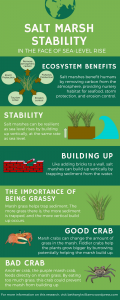Author Archives: Bethany Williams
Final Project Part 2
Part 2 of ASCS Final Project (video)
Final Draft Part 1
Musical Parody Proposal
Salt marsh loss due to accelerated sea-level rise is a major concern, particularly in regions such as the coast of North America, where sea-level rise is 3-4 times greater than the global average. Fortunately, salt marshes have methods for keeping pace with sea-level rise. One such method is landward migration. Marshes move into and displace upland forests, as sea level rises. Another method of resilience is vertical accretion. Salt marshes can build up vertically by trapping sediments, facilitate by plants, on the marsh surface. However, we don’t know how animals, which interact with the plants, influence the trapping of sediments. Therefore, the goal of my research is to understand how animals are affecting sediment deposition, and ultimately vertical accretion, through their interactions with the plants. Specifically, I study two species of crabs, which interact with plants in contrasting ways. The marsh fiddler crab (Uca pugnax) facilitates plant production, while the purple marsh crab (Sesarma reticulatum) eats plants. However, these two species co-occur along a major portion of the North Atlantic coastline (Virginia to Cape Cod, MA) and their net effects on sedimentation could be very interesting. Understanding these effects could also be useful in understanding salt marsh resilience in the face of accelerated sea-level rise.
Multiple stakeholder groups could benefit from learning about my research. For this project, I will focus on young students living in coastal areas of North America. The group I’m targeting can span between early middle school and late high school. By targeting this group I will 1) demonstrate the threat of sea-level rise in their own backyards at an earlier age than generally climate change is taught and 2) reinforce the important of coastal ecosystems. Salt marshes provide habitat for many commercially important species, store carbon, and serve as storm protection, however many young students do not know the importance of this coastal habitat, and its role in their daily lives. By targeting this group, I can help to encourage the idea of conservation of coastal habitats early on in their life. Sharing research with students of this age could also demonstrate how research is done and that working in science does not just mean working in a lab on a microscope, and can be a wide range of experiences.
For this project, I would like to develop a musical parody to a popular song. A popular song will be easily recognized by my target group and provide an instant “hook” because they will recognize it. Some examples of this being done are: “Snail” by ASHELLNATION, which is a parody of “Sail” by AWOLNATION. Another example is “Anaconda-The Educational Version” by College Humor, which parodies “Anaconda” by Nicki Minaj. In these parodies, lyrics of modern songs are manipulated to reflect some educational information. I will choose a popular song and modify the lyrics to explain the importance of salt marshes, the background of my research, and some results from the research I conducted this summer.
In addition to changing the lyrics of the chosen song to reflect my research, I will also include a music video that has images, cartoons, figures, and other pictures to help enhance the understanding of the research that is being sung about. Because sometimes song lyrics can be hard to understand, this music video will feature the lyrics of each frame along the bottom. The final product, song with altered lyrics and music video, will be uploaded to YouTube, my personal website and shared via Twitter.


